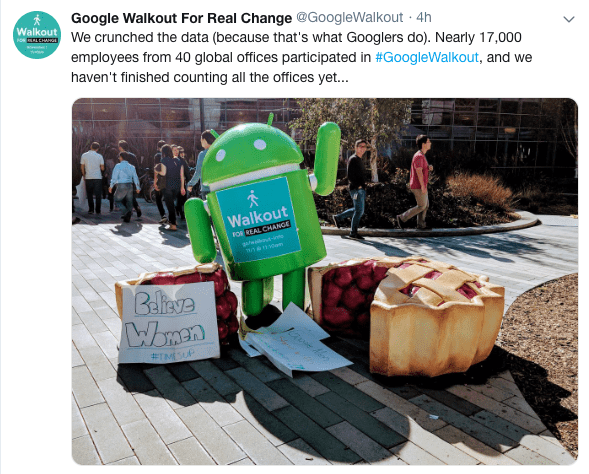Marketing and digital news roundup: 6 big stories from this week
There’s been plenty of big stories breaking this week that affect the worlds of marketing and digital.
From lighter news like Perrier adding a Snapchat filter that mirrored Kanye West’s SNL outfit to bigger announcements that could have an impact on the sectors on the future – such as the UK government’s budget announcement – it has been a busy week.
To help keep you in the know, here are some of the biggest stories from the last week.

UK and Canada summon Mark Zuckerberg to answer fake news questions
The founder and CEO of Facebook has already faced questions from the US Senate this year following the Cambridge Analytica scandal but has so far refused to do the same when requested by the UK and Canada.
Lawmakers from the two countries have now joined forces to host a hearing on fake news and the internet. As part of this, they have requested that Mark Zuckerberg attend the event on November 27th in London.
UK MP Damian Collins and Canadian MP Bob Zimmer sent Zuckerberg a letter asking him to attend an “international grand committee on disinformation and fake news”. The letter states that while it is understood that the Facebook chief cannot make himself available to all parliaments, the organizers of the committee believe that “other countries need a line of accountability to your organization – directly, via yourself.”
There has not yet been an international committee formed to look into Facebook’s role in terms of spreading misinformation, despite the fact that the social media platform has such an impact on an international scale.
Parliaments and politicians who have been unable to gain access to Zuckerberg will also be able to attend the committee hearing.

ASA ‘needs more support’ to regulate online ads
The Advertising Standards Authority (ASA) has stated that the way it works with the industry and how it is funded will need to be looked at in order to help it better regulate online ads going forward.
ASA CEO Guy Parker told Marketing Week that there need to be changes to how it regulates advertisements online over the next year. As consumers spend more time online and advertisers target them more there, Mr Parker said that regulating the increase in ads will require a “commitment” from the industry that is likely to be new to advertising.
He said that this is likely to involve those within the industry playing more of a role when it comes to contributing to the system. This would be in terms of funding and ensuring all ads are responsible.
“We have a good story to tell about the work we’ve done in the last five years regulating online advertising, but we’ve got to double down on it in the next five years,” Mr Parker said.
“Our success will rely on the commitment of the industry to delivering better online advertising regulation. The [self-regulatory system] requires buy-in and support to be sustainable. We obviously need that in the context of our regulation of online advertising.”

Channel 4 moving national headquarters to Leeds
Leeds has been chosen as the new location for Channel 4’s headquarters, after being picked over Birmingham and Manchester. The long selection process saw the Yorkshire city win out, with two Creative Hubs also being earmarked for Bristol and Glasgow.
These moves will represent the biggest change to the organization’s structure since it began35 years ago. The change is part of the 4All UK strategy, which Channel 4 announced back in March this year.
While the channel’s current HQ in London will be kept, the decision will see hundreds of jobs move to Leeds, including key creative decision makers. The new Channel 4 News hub will also be in Leeds and will include a studio, allowing co-anchors to be based in Leeds.
Channel 4’s chief executive, Alex Mahon, said: “Leeds put forward a compelling and ambitious strategy for how they could work alongside Channel 4 to further build the strong independent production sector in the city and develop new diverse talent from across the region.
“Locating our National HQ in Leeds enables us to capitalize on a strong and fast-growing independent production sector in cities across the North of England – and also has the potential to unlock growth in the North East and East of the country, an area without a major presence from other national broadcasters.”

Google employees strike over sexual harassment allegations
Thursday, November 1st saw Google employees across the globe stage mass walkouts in order to protest the tech giant’s handling of sexual misconduct cases. Employees said that they wanted Google to be more transparent when it comes to sexual misconduct cases and pay inequality.
Both employees and contractors from many companies called the company out for having a “workplace that doesn’t work for everyone”.
A Twitter account was set up for the protest and showcased five demands from those taking part, which were:
- An end to forced arbitration in cases of harassment and discrimination.
- A commitment to end pay and opportunity inequality.
- A publicly disclosed sexual harassment transparency report.
- A clear, uniform, globally-inclusive process for reporting sexual misconduct safely and anonymously.
- Elevate the chief diversity officer to answer directly to the CEO and make recommendations directly to the board of directors. In addition, appoint an employee representative to the board.
Employees who walked out on Thursday left leaflets on their desks with the message: “I’m not at my desk because I’m walking out in solidarity with other Googlers and contractors to protest sexual harassment, misconduct, lack of transparency, and a workplace culture that’s not working for everyone. I’ll be back at my desk later.”

Twitter planning to improve in-platform search
Twitter has announced that is looking to improve the search function for advertisers within the social media platform. The plan could help make it easier for brands to deliver ads that are more relevant, as well as content alongside search results.
Jack Dorsey, Twitter’s founder, said: “We do believe it’s a really important part of the service. And we think there’s a lot of ways that we can improve that experience and something that we’re really excited to do.”
However, the company’s first focus will be to improve where people end up after search in a bid to improve retention, Mr Dorsey continued.

Facebook fined £500,000 following Cambridge Analytica scandal
The UK’s data protection watchdog has fined Facebook following its involvement in the Cambridge Analytica data scandal. The social media platform has been fined £500,000 by the Information Commissioner’s Office (ICO), which is the maximum fine it could impose under the old data protection rules.
Facebook received the fine as the ICO said that the platform had allowed app developers to access individual’s data without obtaining “clear content”. The ICO notified Facebook back in July that it was seeking to apply the maximum fine it was able to under rules prior to when GDPR came into effect.
In a statement, the ICO said: “Between 2007 and 2014, Facebook processed the personal information of users unfairly by allowing application developers access to their information without sufficiently clear and informed consent, and allowing access even if users had not downloaded the app, but were simply ‘friends’ with people who had it.”
Facebook has said that it is reviewing the ICO’s decision.